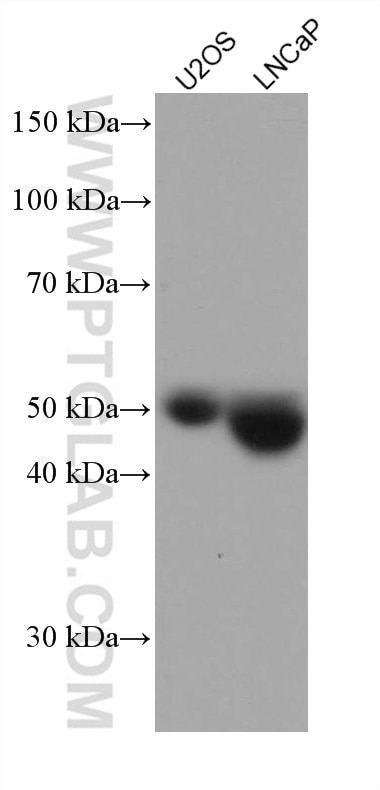Anticorps Monoclonal anti-NAGA
NAGA Monoclonal Antibody for WB, ELISA
Hôte / Isotype
Mouse / IgG2b
Réactivité testée
Humain
Applications
WB, ELISA
Conjugaison
Non conjugué
CloneNo.
2A5F3
N° de cat : 67684-1-Ig
Synonymes
Galerie de données de validation
Applications testées
| Résultats positifs en WB | cellules U2OS, cellules LNCaP |
Dilution recommandée
| Application | Dilution |
|---|---|
| Western Blot (WB) | WB : 1:2000-1:10000 |
| It is recommended that this reagent should be titrated in each testing system to obtain optimal results. | |
| Sample-dependent, check data in validation data gallery | |
Informations sur le produit
67684-1-Ig cible NAGA dans les applications de WB, ELISA et montre une réactivité avec des échantillons Humain
| Réactivité | Humain |
| Hôte / Isotype | Mouse / IgG2b |
| Clonalité | Monoclonal |
| Type | Anticorps |
| Immunogène | NAGA Protéine recombinante Ag7225 |
| Nom complet | N-acetylgalactosaminidase, alpha- |
| Masse moléculaire calculée | 47 kDa |
| Poids moléculaire observé | 50 kDa |
| Numéro d’acquisition GenBank | BC000095 |
| Symbole du gène | NAGA |
| Identification du gène (NCBI) | 4668 |
| Conjugaison | Non conjugué |
| Forme | Liquide |
| Méthode de purification | Purification par protéine A |
| Tampon de stockage | PBS with 0.02% sodium azide and 50% glycerol |
| Conditions de stockage | Stocker à -20 ℃. L'aliquotage n'est pas nécessaire pour le stockage à -20oC Les 20ul contiennent 0,1% de BSA. |
Informations générales
NAGA belongs to the glycosyl hydrolase 27 family. It removes terminal alpha-N-acetylgalactosamine residues from glycolipids and glycopeptides. It is required for the breakdown of glycolipids. Biosynthetic studies performed with cultured fibroblasts indicated that the human enzyme was synthesized as a 65 kDa glycosylated precursor which was processed to a mature 48-kDa lysosomal form; both the precursor and mature forms had high mannose type oligosaccharide chains, but only the precursor's mannose residues were phosphorylated. 90-117 kDa is a homodimer of NAGA.
Protocole
| Product Specific Protocols | |
|---|---|
| WB protocol for NAGA antibody 67684-1-Ig | Download protocol |
| Standard Protocols | |
|---|---|
| Click here to view our Standard Protocols |


